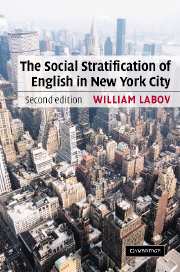Book contents
- Frontmatter
- Contents
- Introductory note
- Preface to the first edition
- Preface to the second edition: forty years later
- I Problems and methods of analysis
- II Social differentiation
- III Social evaluation
- IV Synthesis
- Glossary of linguistic symbols and terminology
- Appendix A Questionnaire for the ALS Survey
- Appendix B Anonymous observations of casual speech
- Appendix C Analysis of losses through moving of the MFY sample population
- Appendix D Analysis of the non-respondents: the television interview
- Appendix E The out-of-town speakers
- Bibliography
- Index
Appendix B - Anonymous observations of casual speech
Published online by Cambridge University Press: 18 December 2009
- Frontmatter
- Contents
- Introductory note
- Preface to the first edition
- Preface to the second edition: forty years later
- I Problems and methods of analysis
- II Social differentiation
- III Social evaluation
- IV Synthesis
- Glossary of linguistic symbols and terminology
- Appendix A Questionnaire for the ALS Survey
- Appendix B Anonymous observations of casual speech
- Appendix C Analysis of losses through moving of the MFY sample population
- Appendix D Analysis of the non-respondents: the television interview
- Appendix E The out-of-town speakers
- Bibliography
- Index
Summary
One of the fundamental problems which is treated in this study is that of eliciting casual and spontaneous speech in the context of the formal linguistic interview, which normally evokes careful speech only. In Chapter 4, methods for obtaining records of casual speech within this framework were described. In order to verify the results, it is necessary to compare them to records of casual speech gathered outside of the context of the linguistic interview. The department store survey described in Chapter 3 is one such method. Another source for such casual speech is the large bulk of anonymous observations on the streets of the Lower East Side, made in the course of the exploratory interviews. The first excerpt given below shows a section of spontaneous speech of working class and lower class young adults which may truly be called the language of the streets. The second is a set of observations made in a middle class area, showing the type of (r) usage which may be heard in everyday conversation.
The punch-ball game
At the corner of Stanton and Ridge Streets on the Lower East Side of Manhattan, there is a punch-ball game organized every Saturday in reasonably good weather. Fifteen to twenty young men, from about seventeen to twenty-five years old, take part. The area is a tenement district, and most of the residents are members of the lower class or working class.
- Type
- Chapter
- Information
- The Social Stratification of English in New York City , pp. 423 - 429Publisher: Cambridge University PressPrint publication year: 2006



